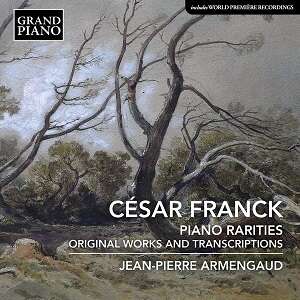
César Franck (1822-1890)
Piano Rarities – original works and transcriptions
Prélude, Fugue et Variation Op.18 (c.1863, arr. Harold Bauer, publ. 1910)
Les Éolides CFF.127 (1875-76 arr. Gustave Samazeuilh, publ.1912)
Prière Op.20 (c.1860 arr. Blanche Selva, publ.1912)
Prélude, Chorale et Fugue (1884)
Ruth, églogue biblique – introduction CFF.179B (1843-45 rev.1860)
Jean-Pierre Armengaud (piano)
rec. 2022, Atelier Musical of Malakoff, France
Grand Piano GP906 [69]
While the transcriptions here are indeed rare – the Selva and Samazeuilh are first recordings – the only real rarity here is the introduction to Franck’s biblical eglogue Ruth first written in 1845 and revised in 1860. The Prélude, Chorale et Fugue is a popular piano solo and Harold Bauer’s of the Prélude, Fugue et Variation transcription has often been recorded. There are recordings aplenty of its companion piece Prière and the orchestral tone poem Les Éolides.
I was most interested to hear the latter but it turns out that this is the one I have most issue with; orchestral versions hover around the 10 to 11 minute mark – the slowest I found was Walter Goehr at 12:25 and the fastest comes in at just under 9 minutes. Okay, music is not necessarily about speed but Armengaud takes nearly 15 minutes to navigate the piece; some of this must be laid at Samazeuilh’s door – it is a dense and complex score that recreates the notes but makes it hard to recreate the textures. Armengaud starts at a reasonable tempo, c.58 bpm but once the semiquavers begin to build up that drops to around c.43 bpm and the sense of one in a bar is lost, one becoming all too aware of the repeating semiquavers rather than, for instance, the melody in the clarinet that rides over the wind figures. At the un peu piu lent, not actually that much slower here, Armengaud opts to replace Samazeuilh’s faster figuration, marked very light with tremolandos from Franck’s four hand transcription. I would have liked to have heard Samazeuilh’s original as the tremolos become a bit tiresome. Overall Armengaud plays well enough but for me it all a little too cautious and lacking in tone colour.
Blanche Selva’s transcription of Prière is more successful and it is nice to hear this having recently reviewed a disc of her idiomatic transcriptions of Franck’s three Chorals (CIAR Classics CC011 review). It is generally a more reflective restrained work and there is some beautiful playing from Armengaud, especially in the central section. He uses quite a bit of pedal but this is less intrusive here than it is in the more familiar Prélude, Fugue et Variation. I am a bit spoiled here having reviewed Mariam Batsashvili’s gorgeous account recently (Warner Classics 9029629061 review) and though Armengaud has a delicate touch and pleasant sound in lower dynamics he does not approach her weightless and effortless playing. The melody often gets lost amongst the figuration and, as in Les Éolides the playing can be somewhat vertical with too little sense of forward momentum. The Prélude, Chorale et Fugue fairs fairly well but again I feel a lack of dramatic connection to the work. I have recently reviewed two grand performances of this work on the Meloclassic label (Julian von Károlyi on Meloclassic MC1062 review and Poldi Mildner on Meloclassic MC1055 review ~ review) and this restrained performance seems all the more low key for that. Again there is some lovely playing but in quieter moments I want Armengaud to dig into the keys a bit more and let the melodies sing with more support – the accompanying figures all too easily swamp the main interest and the section between the choral and the fugue where the left hand triplets enter is just wishy-washy; I know this is pianissimo but where is the sense of dramatic tension building in the swell of dynamics or the question and answer between the voices? The fact that the molto vivo after this is so careful doesn’t help nor does the finger slip in the fourth bar from the end – if this was because of excitement or risk taking it would be less of a problem but that isn’t the case.
The final piece here is Franck’s own transcription of the introduction to Ruth, églogue biblique. The oratorio’s initial lack of success prompted Franck to retire from his public performances and concentrate more on composition and in 1860 his experience he gained led to revised version that was premiered in 1871. This transcription was published after Franck’s death. Much of the music is based around a short bass motif and reflective melody that mirrors it and which then develops though its drama is within a relatively small arena. I enjoyed Armengaud’s playing here much more though I’m not sure this is a piece I shall return to often.
The booklet notes, in English and French, are informative but with the rather boxy sound and the dramatic limitations of the performances this is not the best Franck release and though I was certainly looking forward to hearing these transcriptions I feel more character is needed to bring them to life.
Rob Challinor
Help us financially by purchasing from





















